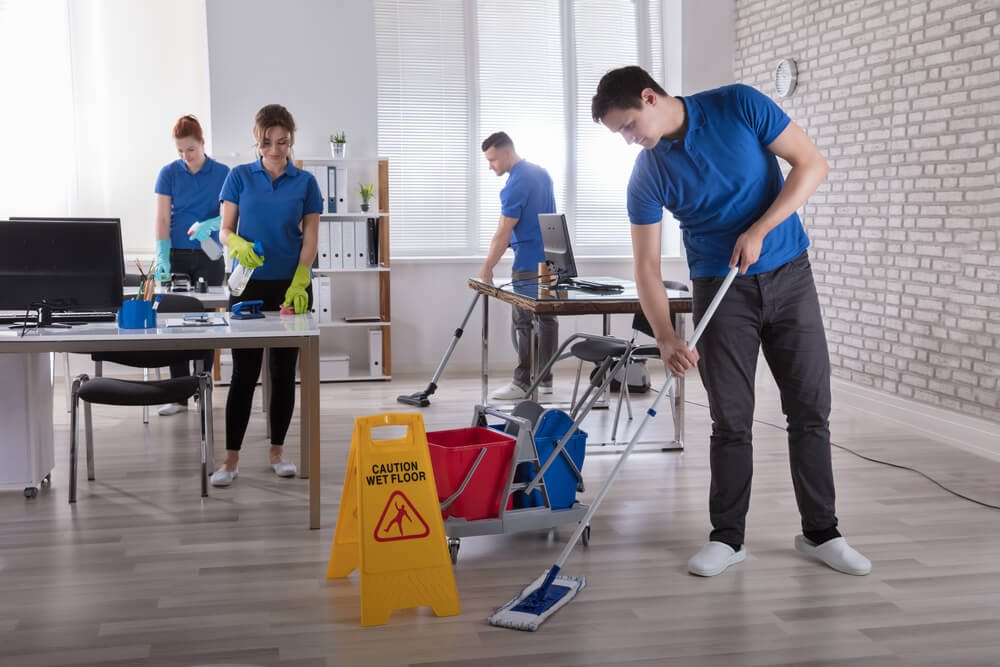The commercial cleaning industry in the UK is witnessing an unprecedented transformation in 2024, driven by a confluence of technological advancements, sustainability initiatives, and a redefined approach to customer service. This year is pivotal, marking a significant departure from traditional practices and setting a new benchmark for operational excellence, environmental stewardship, and customer satisfaction.
Pioneering Technological Advancements
At the forefront of this evolution is the integration of advanced technology, revolutionising how cleaning services are delivered, managed, and optimised. The deployment of business management software is now a standard practice, offering an unmatched level of efficiency in scheduling, invoicing, and customer engagement. This digital transformation facilitates a seamless operation, ensuring that services are delivered promptly and clients are kept in the loop at every stage.
Robotics and artificial intelligence (AI) are redefining the scope of what’s possible within the sector. Robotic cleaning devices are being deployed across large commercial spaces, offering consistent and thorough cleaning without the need for constant human oversight. AI, on the other hand, is optimising routes and tasks, ensuring that cleaning teams are working at peak efficiency, thereby reducing costs and improving service quality. These technological solutions are not just enhancing operational efficiency; they’re also elevating the standard of cleanliness, which is particularly crucial in the post-pandemic era where hygiene is paramount.
Embracing Sustainability
Sustainability is another cornerstone of the industry’s transformation. The emphasis on green cleaning practices reflects a broader societal shift towards environmental responsibility. Companies are increasingly adopting measures to minimise waste, use eco-friendly products, and implement recycling initiatives. This approach not only aligns with the environmental values of clients but also contributes to the global effort to mitigate the impact of climate change.
The industry’s commitment to sustainability is further exemplified by the adoption of green technologies. UV-C technology, for example, offers a powerful yet environmentally friendly method for kitchen deep cleaning and disinfection services. Such innovations are crucial in meeting the heightened expectations for hygiene and safety, demonstrating the industry’s ability to adapt and innovate in response to global challenges.
Challenges and Solutions for Staffing in the Cleaning Industry
In 2024,industrial cleaning services face significant staffing challenges, magnified by the global shift towards more stringent health and safety standards. The demand for skilled, reliable cleaning professionals has skyrocketed, yet the industry struggles with attracting and retaining such talent. This challenge is multifaceted, stemming from competitive labour markets, the need for specialised training, and the industry’s reputation for high turnover rates.
Innovative Staffing Strategies
To combat these issues, cleaning companies are adopting innovative staffing strategies. They’re investing in comprehensive training programs that not only cover the basics of cleaning but also specialise in areas like eco-friendly cleaning practices and the use of advanced cleaning technologies. Companies are also enhancing their value proposition to employees by offering competitive salaries, flexible working conditions, and clear paths for career progression. These efforts aim to not only attract but also retain top talent, ensuring a stable and skilled workforce ready to meet the demands of 2024’s dynamic market.
A New Era of Customer Service
The evolution of the commercial cleaning industry is also evident in its approach to customer service. In 2024, companies are going beyond the traditional service delivery model, emphasising personalised and transparent interactions with clients. This customer-centric approach is about understanding and anticipating the unique needs of each client, offering tailored solutions that go beyond mere cleaning to enhance the overall customer experience. The use of technology plays a pivotal role here, enabling real-time communication and feedback, thereby fostering a sense of trust and partnership between service providers and their clients.
Furthermore, the industry is witnessing a shift in how services are marketed and sold. With a greater focus on building long-term relationships, companies are leveraging social proof, testimonials, and case studies to demonstrate their commitment to quality and reliability. This strategy not only helps in attracting new clients but also in retaining existing ones by consistently meeting or exceeding their expectations.
Conclusion
As we move through 2024, the UK’s commercial cleaning industry is at the cusp of a new era. Driven by technological innovation, a commitment to sustainability, and a redefined approach to customer service, the industry is setting new standards that are likely to influence global practices. This transformation is not merely a response to the challenges posed by the pandemic but a proactive effort to redefine what it means to be a leader in the commercial cleaning sector. The trends observed this year are a testament to the industry’s resilience, adaptability, and unwavering commitment to excellence.










